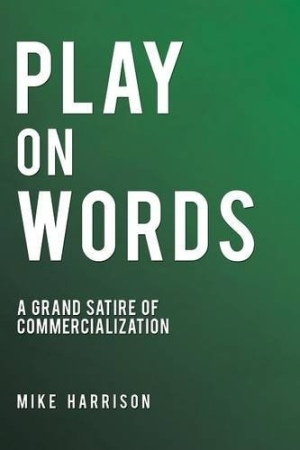
Play on Words
A Grand Satire of Commercialization
This ambitious book full of politics, humor, and linguistics will fit nicely between copies of Walden and Catch-22.
In Play on Words: A Grand Satire of Commercialization, Mike Harrison twists together a blueprint for a libertarian socialist life and a history of the English language, adding them to a fictional story of a woman trying to escape the daily grind. This politically driven book makes the lofty promise that its pages are a “ticket to freedom.”
Emily England has worked her way up the corporate ladder, but she wonders if there’s a more fulfilling way of living. Through conversations with characters of varied backgrounds—including punks, a gay porn performer, and a couple living off the grid—Emily explores both the philosophical and practical sides of alternative living as she tries to find a way out of capitalism. Interspersed throughout the story are three lectures on the evolution of the English language.
The packaging of Play on Words is simple and attractive, with a minimalist green-gradient cover. The back cover features a rambling description of the novella that buries the actual synopsis in the third of five paragraphs.
This is an ambitious book full of politics, history, social commentary, linguistics, humor, philosophy, solar power, and economics. All of these grand themes crowd the slim novella and preclude opportunities for backstory or any other real humanization of the characters. In parable-like fashion, each character stands in for a particular ideology that is explored in conversation. While these conversations help Emily to define her own libertarian socialist ethics, they reveal little about the characters she’s talking to. This leaves important characters like Emily’s boyfriend, her boss, and her sister seeming flat and unexplored.
The book’s pacing is vague and awkward. Diversions into tiny moments of corporate life, such as a company dinner, do little to advance the drama of Emily’s growing frustration with capitalism. Lectures on the English language and a fictional Wikipedia entry create a disjointed feeling. It is difficult to understand how much time passes between the opening line and the sudden ending.
While general audiences may not connect with Play on Words, it’s more likely to be popular in environmental libertarian and anarchist circles. For those already fed up with corporate America and ready to jump into off-the-grid lifestyles disconnected from the pursuit of the dollar, this novella will fit nicely between copies of Walden and Catch-22.
Reviewed by
Constance Augusta A. Zaber
Disclosure: This article is not an endorsement, but a review. The publisher of this book provided free copies of the book and paid a small fee to have their book reviewed by a professional reviewer. Foreword Reviews and Clarion Reviews make no guarantee that the publisher will receive a positive review. Foreword Magazine, Inc. is disclosing this in accordance with the Federal Trade Commission’s 16 CFR, Part 255.
